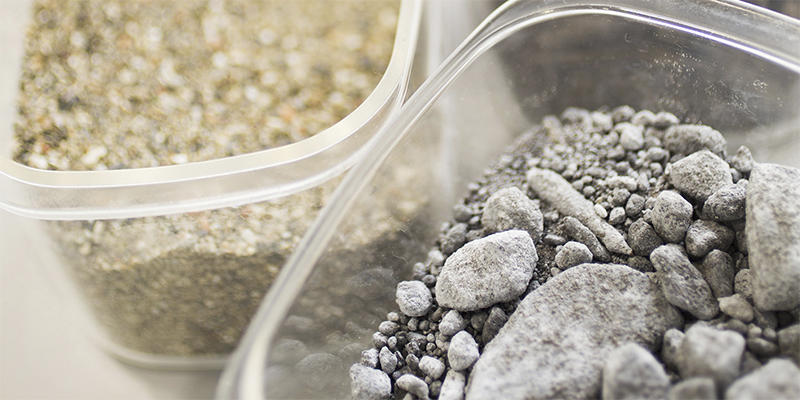
A Pleasant Surprise Finding
− I understand there were some interesting results due to the research work.
Mr. Sasaki: The main thing I was concerned about was the quality of the concrete since some of the waste had been soaked in brine (seawater diluted by freshwater such as those from rivers and rainfalls). I also thought some materials just might not be conducive to producing high-quality concrete. However it seems I was overanxious. Furthermore, there were added findings made during our R&D efforts. For example, we ascertained the fact that brine being used for producing cement, hitherto considered to be a very difficult task, is not as detrimental to the overall structural soundness of the resultant concrete. Moreover, the recycling process seems not to take but a few months.
Prof. Hisada: Yet, I am told that findings such as the use of certain amount of brine as mentioned above by Mr. Sasaki upon mixing cement for concrete production could be very useful for other purposes. I understand there are many countries around the world that cannot produce quality concrete due to lack of usable freshwater. As noted by others, perhaps it can be used worldwide in locations like those facing desertification, not to mention Middle Eastern countries. Member firms like Showa Concrete and Taiheiyo Cement might also be able to work together with marine constructors for improvements in building activities.
Mr. Sasaki: Let me note the fact that the Japanese government has just decided the data obtained and archived will form the basis for dealing with similar disasters in the future. Underlying the momentum behind getting results was the fact that there are SoE graduates found in abundance in the industries, like Nippon Paper and Mitsubishi Materials, as well as the government offices in the Tohoku region. The networking effected by the SoE under Prof. Hisada’s direction, along with support from his colleagues in the JSCE, whose subcommittee formed the original basis for the consortium establishment in 2012, helped push the agenda forward even further. I am very happy to have been associated with the Hisada lab at my alma mater as well.
Prof. Hisada: The new consortium to deal with the debris waste, established in face of such a widespread disaster, shows that Japan can make Industry-Academia-Government alliance work well, and quickly too. It must of course be a sustained effort since the issue of dealing with radioactive contaminants, albeit at minimal level, is an intricate part of the endeavor. I am of course still investigating other recycling processes, as I wish to increase the percentage of debris recycled as much as possible.



